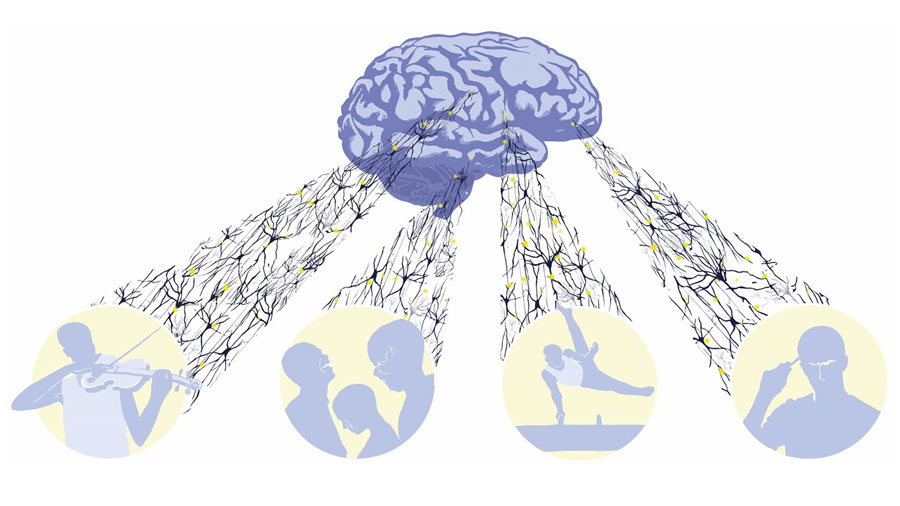Neurodidactics – Research – Department of Teacher Education
Neurodidactics

Goal
Our goal is to strengthen students' understanding of the nervous system, as well as to contribute neuroscience knowledge of relevance to other subject areas. To achieve this goal, we conduct research on- and development of content, teaching methods, teaching tools and teaching environments related to the topic of the nervous system in school. In addition, we investigate how knowledge about the nervous system can be applied in other subjects.
Background
The nervous system is the physical substrate for motivation, learning and memory. Anyone who offers education, regardless of subject area, will therefore benefit from a proper understanding of this system. However, two major obstacles to understanding the nervous system are its complexity and inaccessibility. The nerve cells are small, with thread-like structures extending long distances throughout the body (including the brain) and connect to thousands of other cells. In addition, it is the nerve signals and precisely where they spread throughout the network of nerve cells which are crucial for what we sense, perceive, feel, think, do and learn. These characteristic features make the topic appear abstract and difficult for most students. The teaching often becomes lecture-based, which can reduce student motivation and therefore also the learning outcomes. BUT THIS is what our group aims to CHANGE!
Projects
We can offer projects for doctoral, master's and bachelor's degrees in the following areas (ongoing and available projects):
- Building brains: Development of a brain building kit consisting of pluggable, electronic nerve cells with the purpose of promoting practical learning activities
- Testing of brain building kit in school
- Measurements of students' learning outcomes, motivation and engagement related to the use of the brain building kit
- Examine people's understanding / perception of the nervous system
- Evaluate content on the nervous system in primary and secondary school textbooks
- Ranking of concepts in neuroscience by level of difficulty
- Ranking of neural networks by level of difficulty
- Flipped teaching on topics related to the nervous system
- Open projects (we are open to discuss students' own project ideas)
Selected publications
Selected publications
Kvello, Pål. (2024) Mapping lower secondary school students’ conceptions of three aspects critical for understanding the nervous system. PLOS ONE 19(5): e0301090.
Kvello, Pål; Gericke, Niklas Markus. (2023) Didaktiska perspektiv på undervisning om nervsystemet. Bi-lagan nr 2
Kvello, P., and Gericke, N. (2021). Identifying knowledge important to teach about the nervous system in the context of secondary biology and science education-A Delphi study. PLoS One. 21;16(12):e0260752.
Harstad, O. (2020). Å bli til med litteraturen. En metafysisk og nevrovitenskapelig forståelse av skjønnlitteraturens virkning. Nordisk Tidsskrift for Pedagogikk Og Kritikk, 6.
Kvello, Pål; Barstad, Stine Slaatsveen; Rønning, Bernt; Moen, Elin Tronsaune; Østerlie, Ove. (2020) Omvendt undervisning versus tradisjonell undervisning i naturfag på ungdomsskolen: En studie av elevers motivasjon, forberedelser og læringsutbytte. Acta Didactica Norden (ADNO). vol. 14 (1).
Leader of research group
Members of research group
-
Helena Bichao Associate Professor
+47-73412848 helena.bichao@ntnu.no Department of Teacher Education -
Rodrigo de Miguel Professor of Physical Science
rodrigo.demiguel@ntnu.no Department of Teacher Education -
Maren Skjelstad Fredagsvik Associate professor
+4792846244 maren.s.fredagsvik@ntnu.no Department of Teacher Education -
Ola Harstad Associate professor
+47-73559823 ola.harstad@ntnu.no Department of Teacher Education -
Espen Hoff Assistant Professor
+47-73412641 +4792222656 espen.hoff@ntnu.no Department of Teacher Education -
Øyvind Arne Høydal
+47-73598848 oyvind.a.hoydal@ntnu.no Department of Psychology -
Anne Berit Johnsen Associate Professor
+4741146478 anne.b.johnsen@ntnu.no Department of Teacher Education -
Lars Magne Lundheim Affiliated
+47-73591417 +4790634941 lars.lundheim@ntnu.no NV Faculty Administration -
Nils Kristian Rossing
+47-73551191 nils.rossing@ntnu.no Department of Physics
Students
Masters student:
- Kristi Bakketun
Former master students:
- Dorte Malen Sætre Bjerkeset, master student
- Matilde Bjørkli, master student
- Henrik T. Blomseth, master student
- Ane Hovde Bø, master student
- Siri Børseth, master student
- Eva Saxi Gildberg, master student
- Mats Grydeland Lie, master student
- Jakob Meløy, master student
- Anna Olsvik, master student
- Daniel A Reich, master student
- Eskil K. Rønningen, master student
- Julie Austbø Seth, master student
- Sivert Saure Tofte, master student
- Eline Reinbakk Toftner, master student
- Viktoria Wiik, master student
Former project students:
- Bendik Bogfjellmo, projekt student
- Anders Boye, projekt student
- Inge Eide Johnsen, projekt student
- Sven-Erik M. Kaiser, projekt student
- Marius G. Kristoffersen, projekt student
- Maria Kvello, projekt student
- Markus Kvello, projekt student
- May H. Lillegård, projekt student
- Elias Lundheim, projekt student
- Raven Deadman Lyngstad, projekt student
- Benjamin Nedregård, projekt student
- Henrik Nyholm, projekt student
- Synnøve Rotevatn, projekt student
- Kristin L. Samdal, projekt student
- Trym Sneltvedt, projekt student
